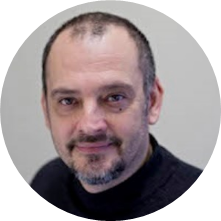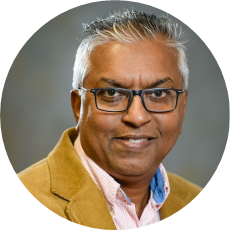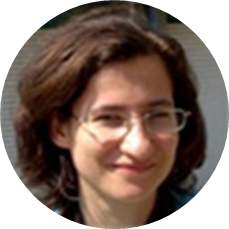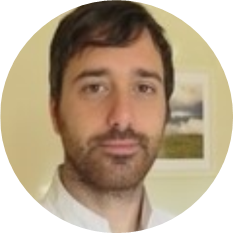Need Help?
24 August 2021
Energies 4th Webinar | Advanced Research in Two-Phase Heat Transfer, 16 September 2021
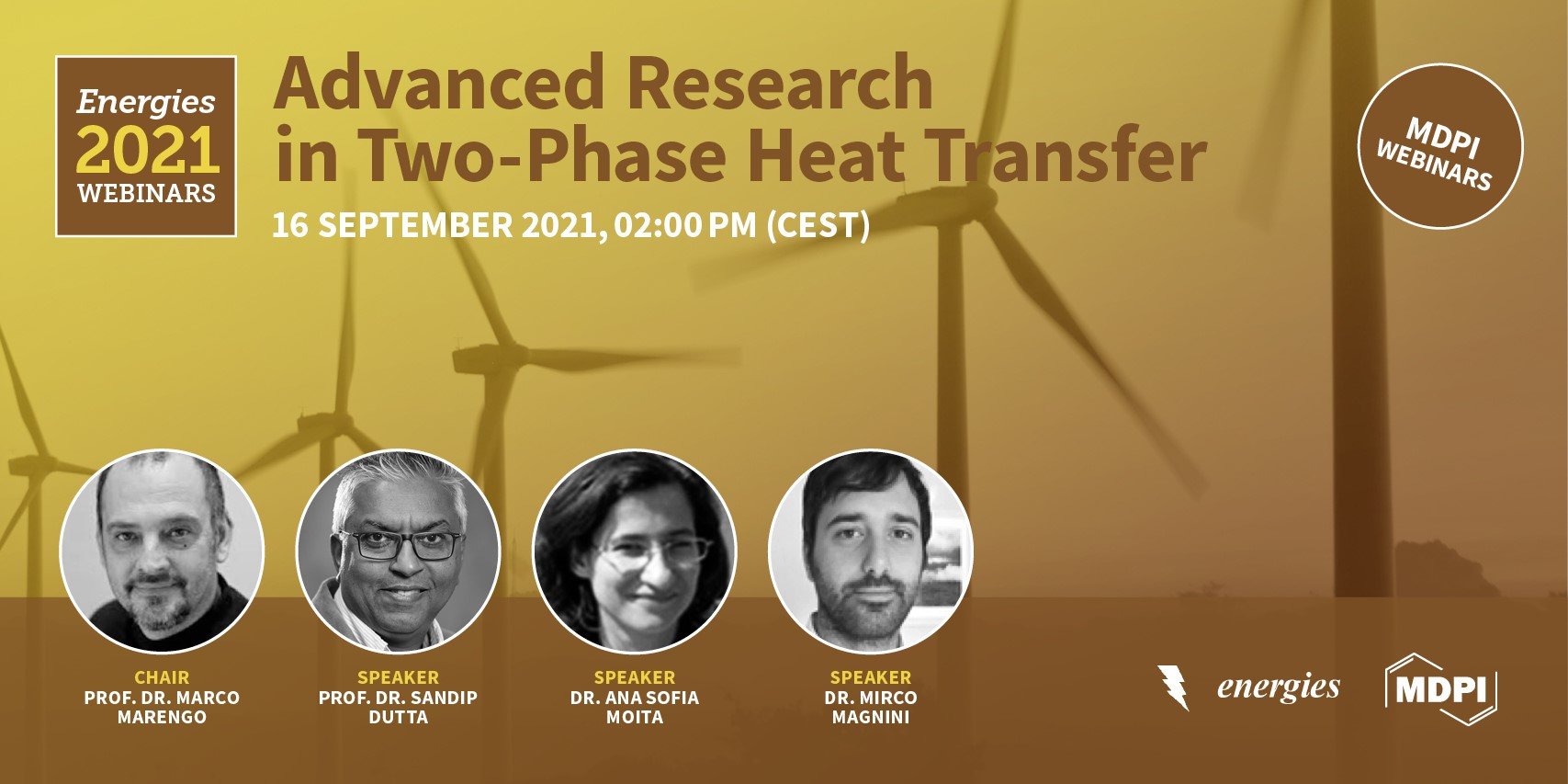
The cooling of electronic components is of utmost importance for the thermal management of data centers, fuel cells, insulated-gate bipolar transistors, and lithium-ion batteries, as well as a variety of other technological applications. Two-phase heat transfer is a great solution for most cases, due to the ability to cope with high heat fluxes and decrease the size of the systems. However, there is still a lack of deep understanding of the complex flow and transport processes and a corresponding lack of reliable and easy-to-use thermal design tools for small-scale components. This webinar intends to show some of the advancements in flow boiling, pool boiling, and recent results for both experimental and numerical research.
Date: 16 September 2021
Time: 2:00 pm CEST | 8:00 pm CST Asia
Webinar ID: 884 9116 7075
Webinar website: https://energies-4.sciforum.net/
Register for free here:
Program
The webinar will last a maximum of 2 and a half hours.
|
Speaker/Presentation |
Time |
|
Prof. Dr. Marco Marengo Chair Introduction |
8:00 pm (CST Asia) | 2:00 pm (CEST) |
|
Prof. Dr. Sandip Dutta "Machine Learning in Two-Phase Heat Transfer" |
8:05 pm (CST Asia) | 2:05 pm (CEST) |
|
Dr. Ana Sofia Moita "Energy Conversion Cooling/Heating (Micro)Systems for Civil and Military Applications" |
8:35 pm (CST Asia) | 2:35 pm (CEST) |
|
Dr. Mirco Magnini "Direct Numerical Simulations of Flow Boiling in Microchannels" |
9:05 pm (CST Asia) | 3:05 pm (CEST) |
|
Q&A Session |
9:35 pm (CST Asia) | 3:35 pm (CEST) |
Chair
|
Prof. Dr. Marco Marengo School of Computing, Engineering and Mathematics, University of Brighton, UK |
Prof. Dr. Marco Marengo is the Director of the Advanced Engineering Centre, Professor of Thermal Engineering, and Chair of the Engineering Industrial Advisory Board at the University of Brighton, UK. In 1991, Prof. Dr. Marengo completed his master’s degree in Physics cum laude at the University of Turin on Dynamical Systems, and in 1996, he received a Ph.D. in Energetics from the Polytechnic of Milan. From 1998 to 2002, he was an Assistant Professor of Thermal Physics and then, until 2016, an Associate Professor of Thermal Physics at the University of Bergamo, Italy. In 2014, he was appointed Full Professor of Thermal Engineering at the University of Brighton. Since 2019, he has been an Associate Editor of the International Journal of Multiphase Flows, and since 2018, he has been the Editor-in-Chief of the Section “Thermal Management” of the MDPI journal Energies. Since 2021, he has been the Associate Editor of Energies. From 2009 to 2018, he was the European Editor of the international journal Atomization & Sprays, Begell House. He is the UK representative on the board of the International Heat Pipe Conference. Prof. Dr. Marengo is an Adjunct Professor at York University, Toronto, Canada and a Senior Research Fellowat the National Science Foundation of Portugal, Centre for Innovation, Technology and Policy Research - IN+, Lisbon, Portugal. From 2005 to 2018, Marengo was a Visiting Professor at the University of Mons-Hainaut. He has founded three spin-off companies. He is a member of scientific committees of various international conferences and an editorial board member of various scientific journals. Since 2015, he has been the co-director of the successful course series LIDESP “Advanced Course in Liquid Interfaces, Drops and Sprays”, and since 2018, he has been the chair of the International Workshop SWEP on “Surface Wettability Effect on Phase Change Phenomena”. He is leading the ESA Pulsating Heat Pipe scientific team and is active in many ESA parabolic campaigns. He has published more than 340 scientific papers, among which more than 80 are in peer-reviewed international journals. Prof. Dr. Marengo is internationally recognized in the fundamental and applied research of two-phase systems, associated with phase change heat transfer, for space and ground applications, as well as in the experimental and numerical modelling of phase-change heat transfer. |
Speakers
|
Prof. Dr. Sandip Dutta Department of Mechanical Engineering, Clemson University, USA |
Prof. Dr. Dutta obtained his Ph.D. in Mechanical Engineering from Texas A&M and is an ASME Fellow. He worked at the faculty of Mechanical Engineering, and then switched his career from academia to industry. Lately, he has re-entered academia and is currently working as a lecturer at Clemson University, South Carolina, USA. Prof. Dr. Dutta has contributed to many different topics, namely: - Computational Sciences: Data Analytics with R and Python; Advanced modeling with Ansys (Finite Element Analysis), Software Quality and Development Life Cycle. Marketing and training for smart image processing products; Manager of software repository hub; Optimization with Python. - Thermal Sciences and Fluid Mechanics: Designs related to turbine blades; Heat and water management in PEM fuel cells; Numerical model development and analysis of complex flows and turbulence in turbine blades; Design of experiments, predictions for the next generation of gas-turbines; Complex, multivariable, statistical numerical analysis of thermal sciences and other engineering problems; Very complex turbulence and fluid dynamics computation using finite element and control volume approaches; Developed a new turbulence model for separated flows. - Automation Technology: Mechatronics, PLC, Factory Automation, Statistical analyses, Finite Element analyses, Control Volume simulations; Instrumentation and non-destructive measurements, field trial validation, Component life assessment, and statistical forecasting. - Software and Hardware Release Management: Bug triage for service releases and new feature evaluations/feasibility studies for new products; Create installation packages and automate builds; Convert UI for multiple languages and regions; Oversee documentation and online help; Developed real-world software for Insurance, Manufacturing, Telecommunication industries and start-up companies; These codes had to be maintainable, readable, upgradable, and fault tolerant. - Machine Vision: Quality and maintenance of complex machine vision and robotics software; Built a link among customers, marketing, training personnel, sales and application engineers, and developers for smooth and systematic product development; Business transition from start-up to an established company; Recent work on “Reverse Engineer the Brain”. |
|
Dr. Ana Sofia Moita CINAMIL – Portuguese Military Academy, Portugal; IN+Center for Innovation, Technology and Policy Research, Instituto Superior Técnico, Universidade de Lisboa, Portugal |
Dr. Ana Sofia Moita is currently a post-doc researcher at IN+/IST and an Assistant Professor at the Military Academy. She completed her Engineering Diploma in 2001, her M.Sc. in 2004 and her Ph.D. in 2009, all in Mechanical Engineering at IST. During the last decade, she has developed her background in interfacial transport phenomena, both at the macro and microscale, with applications to cooling systems, and more recently, to lab-on-chips. She has participated in 12 national and international projects (half of them as a PI-coPI), co-authored 47 papers in peer-reviewed journals, 7 book chapters and 90 papers in international conferences (H=14, with aprox. 841 citations in ISI, H=17, with 1311 citations in Google Academic). |
|
Dr. Mirco Magnini Department of Mechanical, Materials and Manufacturing Engineering, University of Nottingham, UK |
Dr. Magnini is an Assistant Professor in Mechanical Engineering at the University of Nottingham, UK, Subject Editor for Elsevier’s Chemical Engineering Research and Design, and invited member of European Space Agency’s Physical Sciences Working Group. He received a Ph.D. in Energy Engineering at the University of Bologna in 2012, where he worked on numerical methods tailored to the simulation of boiling flows in confined geometries; he was a post-doc researcher at EPFL, Switzerland, from 2013 to 2017, working on simulations and experiments of flow boiling in multi-microchannels and micro-pin fins evaporators, and research associate at Imperial College London in 2018–2019, where he worked on the modelling of wax deposition in crude oil transportation pipelines. At Nottingham, his research lines include analyses of the fundamentals of boiling applied to thermal management in a collaborative project with Brunel University and Imperial College, evaporative cooling of fuel cells in collaboration with EPFL, and thin film and bubbly flows in confined channels in different collaborations with Princeton University and Tel Aviv University. |
For any questions about the webinar, please send an email to [email protected].

